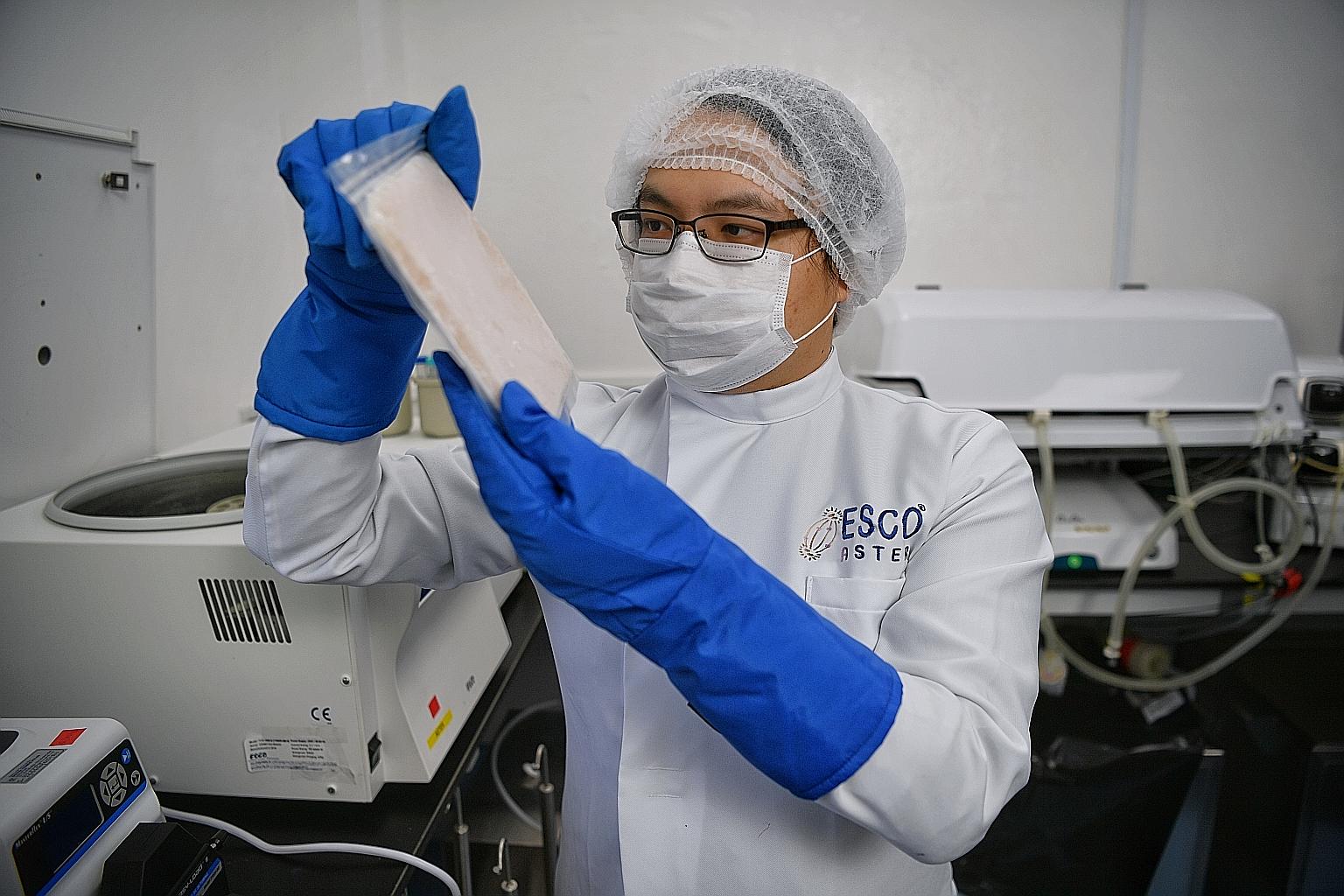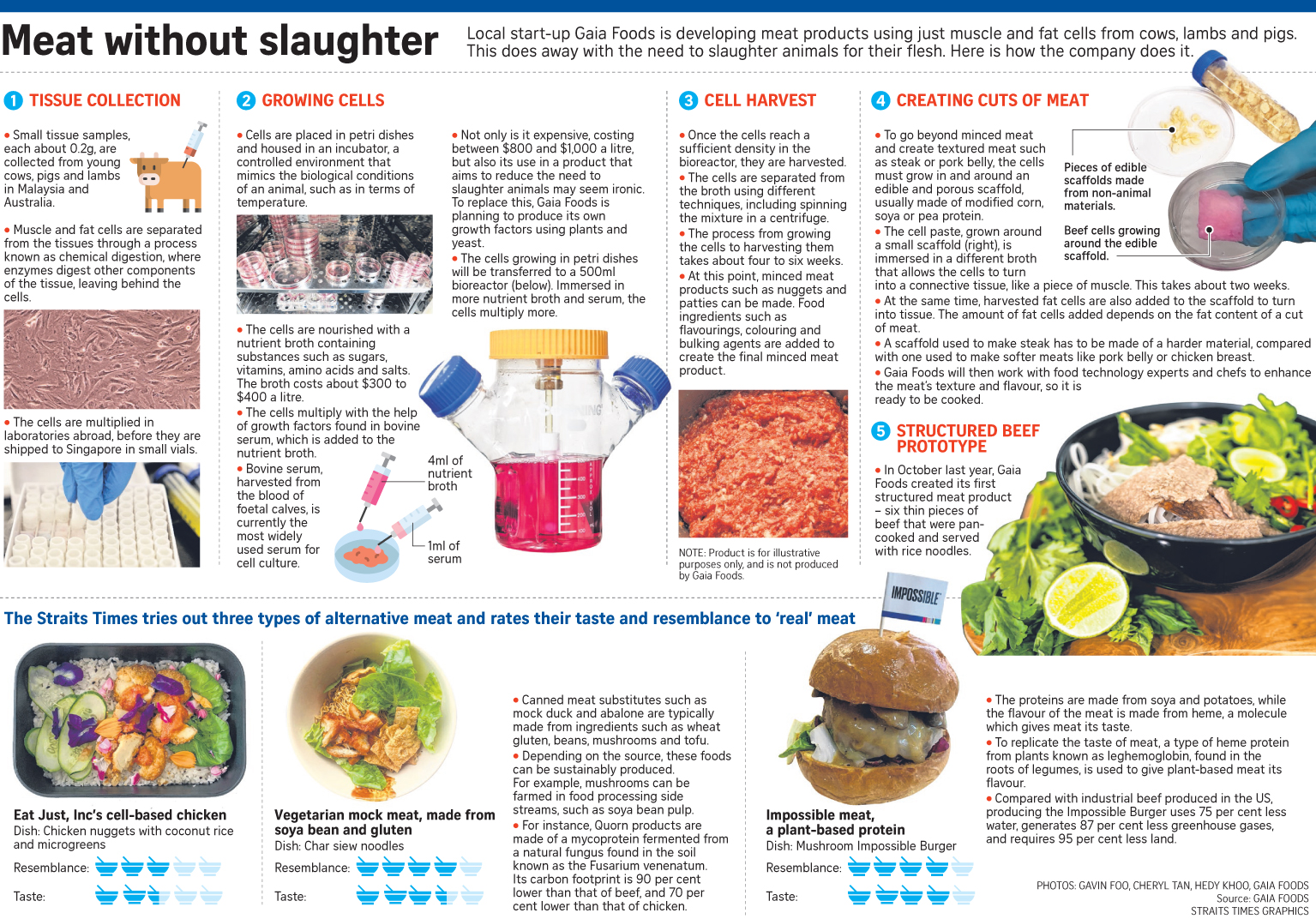More eyeing a bite of alternative meats sector
Over 15 start-ups have set up base here in past two years amid growing awareness of impact of rearing livestock
Sign up now: Get ST's newsletters delivered to your inbox

Mr Lin Xiangliang, chief executive of local biotech company Esco Aster, with a packet of cell-cultured meat. The firm is working to get a Singapore Food Agency licence for one of its labs to produce novel food ingredients. This will enable it to help food tech firms mass produce alternative proteins affordably.
ST PHOTO: CHONG JUN LIANG
Follow topic:
Home-grown novel foods such as cell-cultured and plant-based meats could soon feature more regularly on menus in Singapore.
Over the past two years, more than 15 alternative protein start-ups have set up base in Singapore, Ms Bernice Tay, director of food manufacturing at Enterprise Singapore (ESG), told The Straits Times.
"Local food manufacturers such as Tee Yih Jia and Growthwell have also started to invest in research and development, and production of plant-based meat products, in response to evolving consumer demand," she added.
More firms here are entering the emerging field of alternative proteins amid growing global consciousness about the massive carbon footprint of rearing livestock for food, which produces about 15 per cent of all global greenhouse gas emissions, according to the United Nations Food and Agriculture Organisation.
A study of 10,000 users' data and 62,000 reviews on sustainability app abillion, which helps users find vegan food options, found that local consumers' interest in plant-based pork and chicken products saw a sevenfold increase last year compared with 2019.
Alternative meat products also saw a 306 per cent jump in consumer reviews on the app.
Singapore became the first country to approve the sale of a cell-cultured product last December. The cultured chicken bites by Californian firm Eat Just were made available for home delivery via Foodpanda last Thursday, until May 6.
A report by The Good Food Institute, which promotes protein alternatives, revealed that a record US$3.1 billion (S$4.1 billion) was invested in alternative proteins globally last year - three times the capital raised in 2019.
Ms Tay said ESG is working to further grow the number of companies in this space. The agency partnered five global accelerators to support the growth of 100 agri-food tech start-ups. "We have also anchored several accelerators and venture capitalists in Singapore to nurture and invest in agri-food tech start-ups, including those in alternative protein," she added.
Global food ingredient and flavour supplier ADM last Thursday launched its plant-based innovation lab in Biopolis to offer solutions and expertise in the areas of proteins, texturing and flavour to help firms enhance their products and cater to the Asian palate.
Dr Vinayaka Srinivas, who comes from the life sciences field, co-founded local start-up Gaia Foods in 2019 to develop cell-based cuts of pork, beef and mutton. Seeing the popularity of Impossible burgers then, he saw the potential in developing alternatives to slaughtered meat.
Mr Lin Xiangliang, chief executive of local biotech company Esco Aster, said most cultured meat start-ups here are still at the research and development phase, and will need a platform to make more food - especially if they do not have their own pilot facilities.
The firm - which develops vaccines, cell and gene therapies, and diagnostic products - is working to get a Singapore Food Agency licence for one of its labs to produce novel food ingredients.
This will enable it to help food tech firms mass produce alternative proteins affordably.
Its proprietary bioreactors can be used for growing cell-cultured meat, while its fermenters can be used for plant-based and micro-bial proteins.
Professor William Chen, director of Nanyang Technological University's Food Science and Technology programme, said Singapore is one of the leading countries in the alternative protein space, mainly because of its strong biomedical core.
"Fermentation technology is very similar to vaccine production, and cultivated meat is very similar to tissue engineering," he said.
"The growth potential is certainly bright if we can export the technology for alternative proteins to South-east Asia and beyond. Singapore can be positioned as a hub for these innovations."


